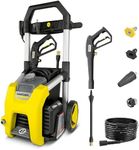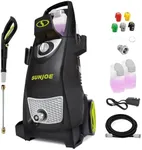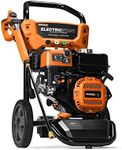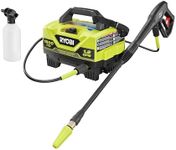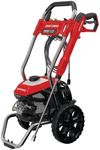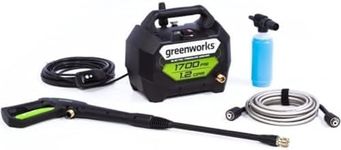Buying Guide for the Best Electric Power Washers
Choosing the right electric power washer can make cleaning tasks around your home much easier and more efficient. Whether you want to wash your car, clean your patio, or remove dirt from outdoor furniture, picking a model that matches your needs is important. To make a good choice, you should understand the main features and specifications that affect how the washer performs and how easy it is to use. By learning what each key spec means and how it relates to your cleaning tasks, you can find a power washer that fits your lifestyle and cleaning goals.Pressure (PSI)PSI stands for pounds per square inch and measures the water pressure the washer can deliver. Higher PSI means more cleaning power, which is important for tough jobs like removing stubborn stains or cleaning concrete. Lower PSI is gentler and better for delicate surfaces like cars or outdoor furniture. Light-duty washers usually have up to 1,800 PSI, which is good for small jobs. Medium-duty models range from 1,800 to 2,800 PSI and are more versatile for home use. Heavy-duty washers go above 2,800 PSI and are best for large or very dirty areas. To pick the right PSI, think about what you plan to clean most often—choose lower PSI for gentle cleaning and higher PSI for tougher tasks.
Water Flow Rate (GPM)GPM stands for gallons per minute and tells you how much water the washer uses. A higher GPM means the washer can rinse away dirt faster and cover larger areas more quickly. Lower GPM is fine for smaller, targeted cleaning jobs. Most electric power washers have a GPM between 1.2 and 2.5. If you want to clean big surfaces like driveways or decks, a higher GPM will help you finish faster. For smaller or more detailed cleaning, a lower GPM is usually enough. Match the GPM to the size and type of cleaning you expect to do most often.
Nozzle OptionsThe nozzle controls the shape and intensity of the water spray. Different nozzles are designed for different tasks, from a narrow, powerful jet for tough stains to a wide, gentle spray for rinsing. Some washers come with interchangeable nozzles or adjustable spray wands. If you want flexibility for different cleaning jobs, look for a washer with multiple nozzle options. If you only plan to do one type of cleaning, a single fixed nozzle may be enough. Consider what surfaces you’ll clean and choose a washer with nozzle options that match those needs.
Portability and WeightPortability refers to how easy it is to move the washer around. Lighter models are easier to carry and store, while heavier ones may have wheels for easier movement. If you need to move the washer up and down stairs or around a large yard, a lightweight or wheeled model will be more convenient. If you plan to keep it in one place, weight may not matter as much. Think about where and how you’ll use the washer to decide how important portability is for you.
Power Source and Cord LengthElectric power washers need to be plugged into an outlet, so the length of the power cord can affect where you can use it. A longer cord gives you more flexibility to move around, while a shorter cord may require an extension. Make sure the cord length matches the distance from your power source to your cleaning area. Also, check if the washer is compatible with outdoor outlets and if it has safety features like a ground fault circuit interrupter (GFCI).
Detergent SystemMany electric power washers have a built-in detergent tank or a way to add soap to the water stream. This feature is useful for cleaning cars, siding, or other surfaces that need more than just water. Some systems let you control how much detergent is mixed in. If you plan to use soap often, look for a washer with an easy-to-use detergent system. If you only need water cleaning, this feature may not be as important.
Hose Length and StorageThe length of the hose determines how far you can reach from the washer without moving it. A longer hose is helpful for cleaning large areas or reaching high spots. Some washers also have hose reels or storage hooks to keep the hose organized. If you want to avoid frequent moving or want tidy storage, consider hose length and storage features when choosing your washer.
